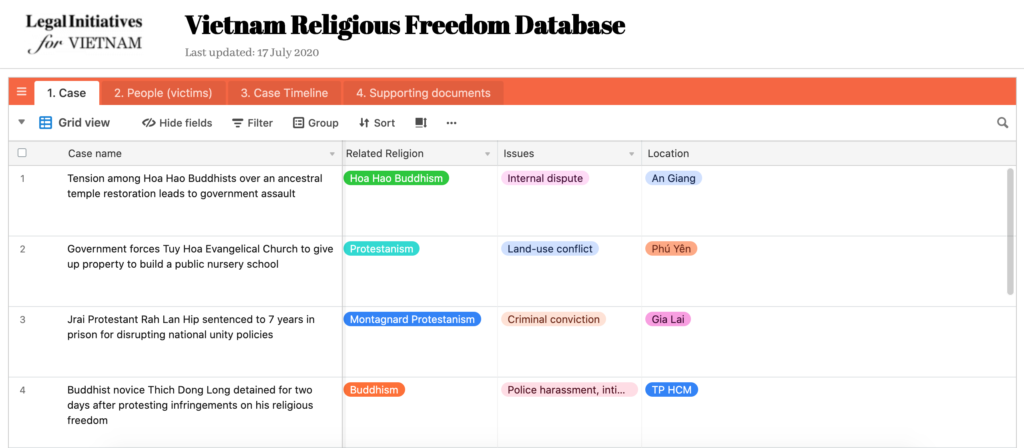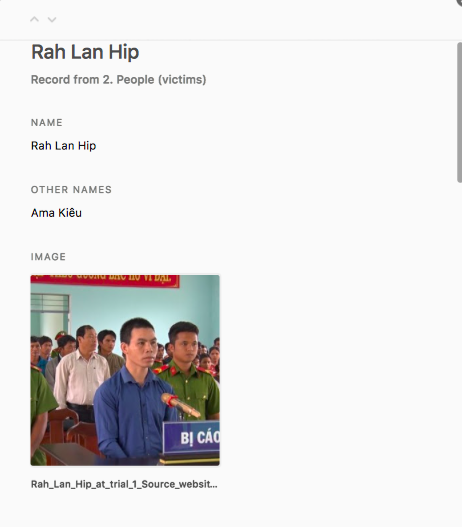Trial in Absentia Ends With 17-Year Prison Sentences for Lê Trung Khoa and Nguyễn Văn Đài
Key Events * Lê Trung Khoa and Nguyễn Văn Đài Sentenced to 17 Years in Absentia; * Y Quỳnh B’Đăp Appears

On July 17, 2020, Legal Initiatives for Vietnam (LIV) launched its Database on Religious Freedom in Vietnam.
LIV is a non-profit organization based in California (United States) and is the organization that oversees both Luat Khoa Magazine and The Vietnamese. You can find more information about LIV and the reason the organization is based in the United States (and not Vietnam) here.
With this regularly-updated data, LIV hopes to begin documenting cases related to religious freedom, both past and present.
It could be an issue related to the land dispute between the Tuy Hoa Protestant Church and Phu Yen provincial authorities. It could be the trial of an ethnic minority member from the Central Highlands who practiced Dega Protestantism or trials for those who promoted Falun Gong.
It could also be the conflict between Hoa Hao Buddhists in An Giang Province regarding the restoration of the An Hoa Tu Temple or the scuffles between unaffiliated Hoa Hao Buddhists and local police.
Currently, when you access this data, you will see 19 cases (among them, more than 20 events involving Falun Gong practitioners have been combined into one case), with more than 91 victims or persons directly involved. Other cases are still being updated.
To expand the number of readers, this data content will be presented in English. After consulting the Q&A information below, you can access data regarding freedom of religion here: www.liv.ngo/data
The multi-faceted religions of Vietnam are a national point of pride, and the strength of religion and faith has contributed to the ability of Vietnamese to persevere through difficult periods in history.
After April 30, 1975, however, many people became victims of the Vietnamese state’s harsh religious policies.
Although the strict control of religion has gradually decreased over time, the state still maintains a tight spiritual grip on religion. Activities that lay outside government control or that allegedly do not support the government’s efforts to build “national unity” are all seen as illegal.
As an organization that primarily conducts journalism, LIV has encountered many difficulties in evaluating the situation regarding freedom of religion and faith in Vietnam. Unlike cases involving freedom of speech or other political cases, those involving religion are generally not known or else fall into obscurity. For cases that are known, information is spotty and lacking. We believe that other press and human rights organizations also encounter similar problems.
Because of this, our initial data is created by compiling information regarding cases related to religious freedom in a systematic way. We hope this data can be a useful source of information for journalists, activists, as well as readers who care about the right to freedom of religion.
The compiled data is based on information coming from sources such as local and foreign journalists, as well as from human rights organizations.
Furthermore, where such arrangements can be made, LIV will directly gather information from the people involved.
Database information only includes cases reported by journalists and those people directly involved. We will not provide our own viewpoints regarding these cases.
We hope readers will contribute information about cases that they are familiar with. For directions on how to contact us, please see the section “How Can I Provide Information?”
Readers can view the data using the Air Table tool. This is an interactive spreadsheet tool that makes it easy to find information without having to switch tables.
When you open the link www.liv.ngo/data, you will see four tables: 1. Case, 2. People (victims), 3. Case Timeline, and 4. Supporting Documents.

For information about each case, you only need to read Table 1. All information in the other, remaining tables are connected to this first one.
In Table 1, you’ll see the name of each case in the first column, with the relevant information added across rows.
In the next four columns, you can filter cases according to more detailed information: Related religion, Issues, Location, and Status, by pressing the “Filter” button and entering the information you want filtered.
For example: if you want to find cases that occurred in An Giang Province, press “Filter”, choose “Location”, and pick the province of “An Giang”.
In the three columns near the end of Table 1, including People, Case Timeline, and Supporting Documents, you can see that the information here is colored. With these three columns, you can click on the phrases in each cell to view more detailed information.
For example, if you want to read more information about individuals related to the case of Rlan Hip, an ethnic Jrai sentenced to seven years in prison for disrupting national unity, you can press on his name in People (victims) in Table 1. Information about the victim, Rlan Hip, will appear as follows:

The People section includes the personal information of relevant individuals, such as birthdate, ethnicity, identifying photographs, gender, and activity timelines.
Case Timeline provides chronological summaries of cases based on information from sources that we have quoted in the penultimate column of Table 1.
Supporting documents can be videos, photographs, or any materials related to each case.
Similarly, you can also filter data by Table 2. People (victims) to look at information according to gender, ethnicity, religion, and criminal prosecution.
We hope you can contribute to this religious freedom database as much as possible. Tell us about cases involving religious freedom that you know about or are directly involved in.
Readers can send us information through this link: bit.ly/vuviectongiao. We’ll reach out to you as soon as possible to gather more information. You can also provide us information anonymously. Information provided will only be used for this religious freedom database and will not be given to any third party.
As we compile and present data, it will be difficult to avoid errors, and we hope readers can take a little time to contribute their thoughts. Email us at tongiao@luatkhoa.org or religion@liv.ngo.
Vietnam's independent news and analyses, right in your inbox.